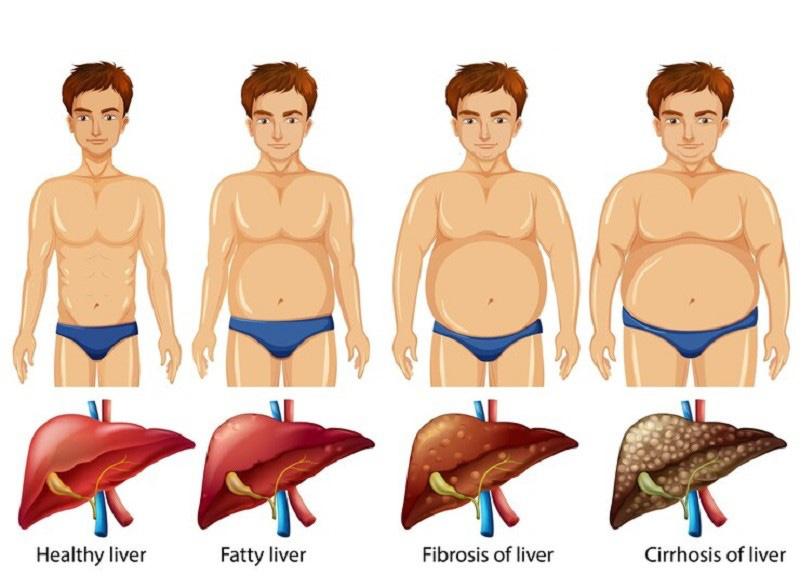
Depending on the level of increased liver enzymes, it affects health - Photo BSCC
Liver damage affects health
Dr. Dinh Van Chinh (Medlatec Hospital) said that liver enzymes are indicators that reflect liver health. Monitoring liver enzyme indexes not only assesses overall health status, but also helps to correctly identify liver health status to best protect liver function.
Liver enzyme indexes often prescribed by doctors include AST, ALT, GGT. Normal indexes are within the allowable thresholds: ALT (GPT): 5 - 37 UI/L; AST (GOT): 5 - 40 UI/L; GGT: 5 - 60 UI/L. Exceeding the normal threshold will be considered a high liver enzyme index:
Mild level: AST, ALT, GGT: 40 - 80 IU/L, warning of the risk of fatty liver, viral hepatitis or/due to alcohol, obesity...
Average level: AST, ALT, GGT: 80 - 200 IU/L, warning of impaired liver function, can cause complications such as cirrhosis, cirrhosis with ascites.
High levels: AST, ALT, GGT >200 IU/L, causing serious damage to liver cells, can lead to cirrhosis, liver failure, even liver cancer...
There are many causes of elevated liver enzymes such as hepatitis, fatty liver, alcohol abuse, side effects of drugs, diet affecting the liver, and liver and biliary diseases.
Viral hepatitis such as hepatitis A, B and C are common causes of elevated liver enzymes. Excessive alcohol consumption directly damages liver cells leading to inflammation, fat accumulation in the liver due to fatty liver disease, which is also the reason for elevated liver enzymes.
Improper use of drugs can be a serious cause of damage to this organ. Drugs such as anti-inflammatory drugs, pain relievers, antipyretics, lipid-lowering drugs, antibiotics, anti-tuberculosis drugs, cardiovascular drugs and anti-epileptic drugs can easily damage the liver, especially when overdosed.
To avoid the risk of liver damage, patients need to strictly follow the dosage and instructions of the doctor.
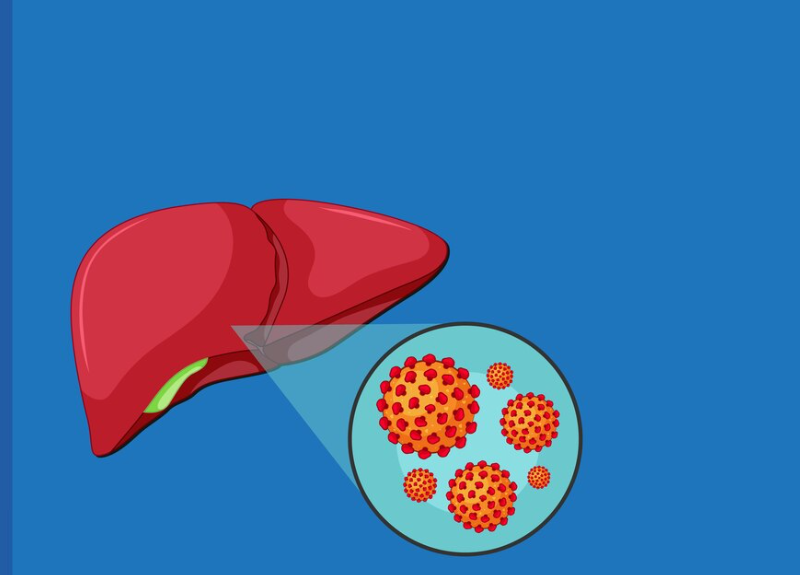
Viral infection causes elevated liver enzymes - Photo BSCC
High liver enzymes need to take medicine?
Dr. Nguyen Xuan Tuan, lecturer at the University of Medicine and Pharmacy, Hanoi National University, said: In many cases, changing lifestyle can help improve high liver enzymes without medication.
Increased liver enzymes due to non-alcoholic fatty liver disease can be treated with medication combined with lifestyle changes, weight loss, dietary adjustments, physical activity, blood sugar control...
Note that for the use of liver enzyme-reducing drugs to be effective and safe, patients should only use drugs when prescribed by a doctor. Do not buy drugs or change the dosage on your own.
Drug abuse can lead to unwanted side effects. Closely monitor your body's response while taking the drug. If you experience any unusual symptoms, notify your doctor immediately.
Anyone can lower liver enzymes at home.
Exercise every day: Exercise not only helps improve health but also has a very positive effect on liver function, supports the liver to detoxify, helps limit many other diseases, lose weight, reduce excess fat, maintain weight and prevent obesity leading to increased liver enzymes. You should maintain the habit of exercising at least 30 minutes a day.
Drink plenty of water: Water is an important factor in eliminating toxins and lowering liver enzymes. Along with regular exercise, drinking plenty of water helps the body promote blood circulation and metabolism, regulate liver activities to help the liver eliminate toxins better.
Weight loss : Obesity is also a cause of high liver enzymes. Therefore, weight loss is also an effective way to lower liver enzymes and control liver enzymes better.
Daily food choices: You should choose fresh, unprocessed foods that contain healthy nutrients to help purify the body and is a way to lower liver enzymes without medication, very safe and effective:
Green vegetables: The best vegetables for people with high liver enzymes are usually cruciferous vegetables such as kale, broccoli, cabbage, etc.
Eat foods rich in antioxidants: Antioxidants help reduce liver enzyme levels and optimize liver function. You should eat foods rich in antioxidants such as avocados, chestnuts, beets, etc.
Supplementing vitamin C: Vitamin C plays an important role in the body's immune system, has the effect of enhancing resistance, helping to lower liver enzymes and reduce liver damage. Supplementing vitamin C from fruits such as oranges, tangerines, lemons, grapefruits, strawberries...
Limit fast food: Fast food and processed foods are not only high in fat, but also often high in salt, which not only affects the liver but can even have a negative impact on the kidneys.
Do not use alcohol: The liver is responsible for eliminating toxins from the body, from the foods you eat and from alcohol. When you drink alcohol, it puts more pressure on the liver to eliminate toxins from the body. This condition, if prolonged, will cause liver damage and weakening.
Find out about the medications you are taking: Some pain relievers or common treatments often contain ingredients that affect the liver. If used too much over a long period of time, it can cause liver or kidney failure.
If you have high liver enzymes, one way to lower liver enzymes is to consult your doctor before using to ensure it does not harm the liver.
Keep your living environment clean : The environment is also a factor that damages the liver, especially dust and smoke in the environment such as vehicle exhaust, dirt, cigarette smoke, industrial dust, etc.
Get enough sleep every day: This is a way to lower liver enzymes during the treatment of high liver enzymes. You should get enough 8 hours of sleep every day to ensure the best health, giving the liver time to rest and function most effectively.
Signs of high liver enzymes
- Body rash: Increased liver enzymes cause toxins to accumulate inside the body, causing red rashes on the skin and local itching.
- Edema: Increased liver enzymes reduce liver function, limiting detoxification function. As a result, the body experiences edema, swelling of the hands, feet, etc.
- Jaundice: The most recognizable sign of increased liver enzymes is jaundice. Instead of a rosy white skin full of vitality, the patient's skin shows signs of yellowing, paleness, and lack of vitality.
- Pain in the right flank: The liver is located in the right flank, so when sick, you always feel a dull, extremely uncomfortable pain in this area. Therefore, you need to go to the doctor for early detection and treatment.
- Pale yellow stool: Not only yellow skin, but when the liver is weak, bile duct obstruction causes the stool to be pale yellow and cannot go down to the intestines, making it difficult to defecate.
 Self-treating hepatitis B with herbal medicine, liver enzymes increased 35 times
Self-treating hepatitis B with herbal medicine, liver enzymes increased 35 timesSource: https://tuoitre.vn/chinh-men-gan-cao-theo-cach-tu-nhien-tai-nha-khong-dung-thuoc-20241004075802517.htm




![[Photo] Conference of the Government Party Committee Standing Committee and the National Assembly Party Committee Standing Committee on the 10th Session, 15th National Assembly](https://vphoto.vietnam.vn/thumb/1200x675/vietnam/resource/IMAGE/2025/10/15/1760543205375_dsc-7128-jpg.webp)

![[Photo] General Secretary To Lam attends the 18th Hanoi Party Congress, term 2025-2030](https://vphoto.vietnam.vn/thumb/1200x675/vietnam/resource/IMAGE/2025/10/16/1760581023342_cover-0367-jpg.webp)





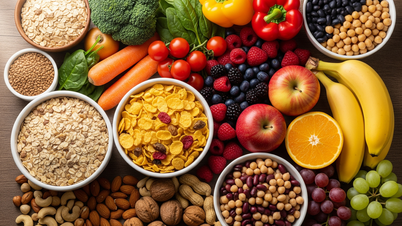

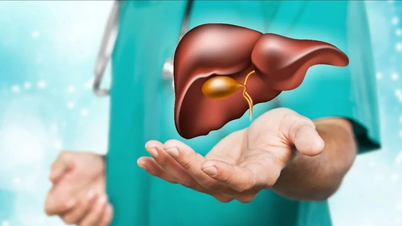

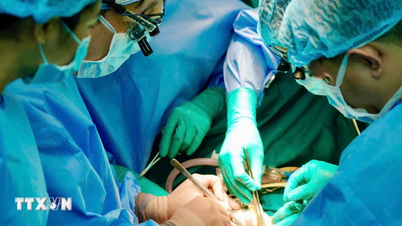



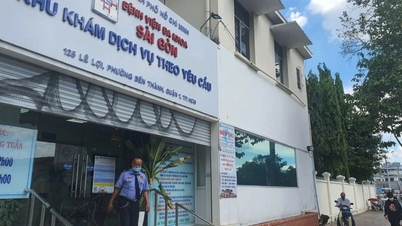











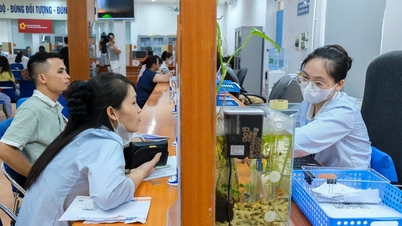








![[Video] TripAdvisor honors many famous attractions of Ninh Binh](https://vphoto.vietnam.vn/thumb/402x226/vietnam/resource/IMAGE/2025/10/16/1760574721908_vinh-danh-ninh-binh-7368-jpg.webp)

































































Comment (0)